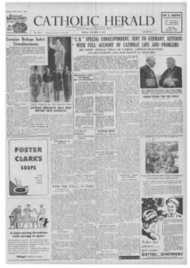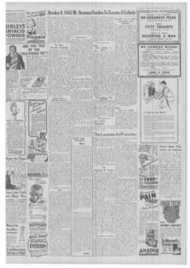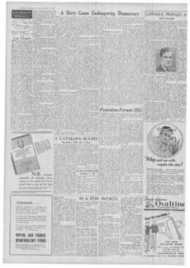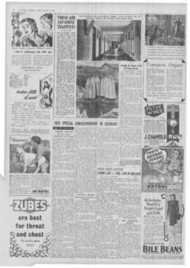Page 3, 5th October 1945
Page 3
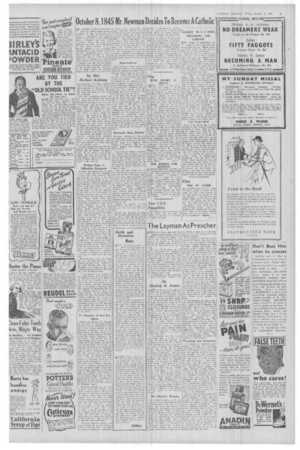
Report an error
Noticed an error on this page?If you've noticed an error in this article please click here to report it.
Tags
Share
Related articles
Newman Canonised' By The Universities
Background To Newman's Apologia
'christian
An Oxford Heresy Hunt
U.n. Day Mass
October 8, 1845 Mr. Newman Decides To Become A Catholic
by Rev.
Herbert Keldany
ON October 8, 1845, there took
place in a little village on the outskirts of the University of .Oxford a long-expected event which marked a turning-point. in the religious history of England and whoec full after-effects history will record for generations to come The submission of John Henry Newman to Fr. Dominic Barberi as the accredited representative of the Catholic Church and his participation in her sacraments expressed something far more momentous than the conversion of a single soul, for Newman was a theologian. a leader of a party in the Church of England, one who had for nearly thirty years heen a prominent member of the principal Protestant university in the world. Further, the Catholic Church in this country was then small
and disregarded " no longer a Church —but a few adherents of the Old Religion, mernorim of what had been," and in Europe, even in Rome, there were many who spoke as if her days were numbered.
While the shortsighted children of this world were counting their gains and looking forward not only to the extinctiort of the Papacy but to an age "emancipated from all religion, theie were. thank God, many others endowed with that perspective, longsighted because it is the fruit of grace, that " Vision of Peace," which sees events of this world in the light of eternity. The name of the Anglican clergyman at Oxford was known to some of these while °the's merely prayed for the return of the Church of England to Catholic Unity. He in his turn, and many ot his friends, had for years devoted both prayer and study to the defence of the Truth revealed by Jesus Christ, and steadily they had come to recognise in the Catholic Church its divinely-appointed safeguard, " a great overwhelming objective Ma—venerable yet young. majestic yet infinitely tender."
No other consideration than this pursuit of " the Truth and nothing but the Truth " had for Newman any importance. He was willing to give up his friends. his work, the university he loved almost as much as life itself, in order to follow wherever the " Kindly Light " might lead him.
Writing Stops as Difficulties Disappear Six years had elapsed since he had set eyes on the words of St. Augustine, " securus judicat orbis terrarum," that had pulverised his theory of the Via Media by which he sought to steer a course that was half-way •between Rome and Canterbury. Early in 1845 he had written to his close friend, Pusey: "I am as muuh gone ever as if I were already gone," hut he was immersed in his work on the Development of Christian Doctrine, and not until he had finished it would he make a move. Others whose simpler minds were strangers to his own resolve to resist the promptings of impulse for a fixed lime' became impatient and made their submission without waiting for their leader, thereby relieving him of the scruple tbat lie had " unsettled " their minds. Oakeley resigned from the Margaret Street Chapel and was condemned in the Court of Arches for preaching heresy. W. G. Ward, who had surprised everyone by getting married, announced that he agreed with his wife when she exclaimed: "I cannot stand it. I shall go and be received into the Catholic Church," came up to town, and was received at the old Jesuit Chapel in Bolton Street. The Times, while rejoicing that " the day of his Jesuitical double-dealing is happily over," was nevertheless rattled, as the following sentence shows: " The aspect of affairs in the Church grows every day more startling One strange event so rapidly supersedes another, that men'.s minds have undergone a complete mystification and they now even cease to wonder what will come ne
Wards had set up house at Rose :
b.
Hill, not far from Littlemore, and Oakeley was often at the " monastery." but while 'Newman knew what was happening that summer he was still absorbed in prayer and study. His book was to be the decisive factor.
"I was hard at it all through the year until October. As I advanced so my difficulties cleared away. Before I got to the end I resolved to be received. and the b ook remains in the state it: which it was then, unfinished. One of my friends at Littlemore had been received on Michaelmas Day, at the Passionist House at Aston. by Father Dominic. At the beginning of October the latter was passing through London to Belgium. and as I was in some perplexity what steps to take for being received myself, I assented to the proposition made to me that the good priest should take Littlemore in his Way. with a view to doing for me the same charitable service as he had done to my friend."
Fr. Dominic: A New Era Opens Newman had known of lir. Dominic for sonic time, for the zealous Italian priest had beea in correspondence with one of the younger members of the Littlemore community, and, as Dr. Denis Gwynn has lately shown, it is plain that Newman iegarded Dominic as the ideal Catholic missionary. lie had indeed " gone barefoot into our manufacturing towns, preached to the people like Francis Xavier. been pelted and trampled upon," but he had also kept more than half an eye on the Oxford men, so that when J. R. Dalgairns came to him at Michaelmas he plied him with questions about Newman's state of mind, and presciently foretold that "when the learned and holy, superior of Littlemore conies then we shall see the beginning of a new era." Even when he was invited to break his journey at Littlemore Newman had not spoken his mind, though he had made sonic obvious dispositions for the final step; he had resigned his fellowship of Oriel and prepared a series of letters It) his closest friends—that to Pusey runescharacteristically, " anything may happen to me now any day." For a description of the final events we learn on Dafgairns' report: ' Wednesday, October 8t1,, 11a1.1 a day of leaden skids and pouring rain. About 3 o'clock I went to take my hat and stick and Walk across the fields to the Oxford ' Angel,' where the coach stopped. As 1 was taking my stiet Newman said to me in It very low and quiet tone, When you see your friend will you tell hint that I wish him to receive me into the Church
of Christ '?' l said, ' Yes' and rto more. I told Fr. Dominic as he was alighting from the top of the coach. He said God be praised," and neither of us spoke again until we reached Litilettore." Here we turn to Fr. Dominic's own recollections:
"This news filled me with joy and made me forget the rah: that had been pelting me for five hours. We drove in a chaise to I-Alden:ore. I immediately sot down near a fire to dry my doilies. when Mr Newman entered and throwinA himself at my feet, asked my blessing, begging me to hear his confession and receive him into the Church.. . (This lw did together with two others). These three made their profession of Faith in the usual form with such fervour and piety that I was almost out of myself with joy. I attenvard.s gave them canonical absolution, and administered to them the sacrament of Baptism sub conditione.' On the following morning I Amid Mass. in their oratory and gave Communion to them."
Repercussions
Bishop Wiseman, writing soon after wards ftorn ()scour to Dr. Russell, of Maynooth expressed the mind of those who had been praying for the event:
" How sudaen after all his 0011Version was, and how accidental the mode of his being received. . . I assure you the Church has not received, at any time, a convert who has joined her in more docility and simplicity of faith... I have often said I should be ready to sing my Nitric Dimittis when Mr. New,man should have joined us. I must not draw back from my word."
T. W Allies who was not to follow him for another five yeats, expressed that of many in Oxford: " I have been so long expecting the blow, that it was almost a relief when it fell." Others made light of the blow, but Pusey, who recognised that this was " Perhaps the greatest event which has happened since the communion of the Churches was inter' upted," added: " If anything could open their eyes to what is good in us, or soften in us any wrong prejudices against them. it would be the presence of such a one, nurtured and grown to such ripeness in our Church and now removed to hell s."
Newman's Nunc Dim ittis
No better indication of Nevrman's own mind can be given than the lines he added to the manuscript of the hook he had begun as an Anglican said finished as a Catholic. Like that of ancient Simeon's Nitric Dimittis, his words still live:
" Such were the thoughts concerning the ' Blessed Vision of Peace' of one whose long-continued petition had been that the Most Merciful would not despise the work of His own hands, nor leave him to ,himself—while ye? hts eyes were dim. and his breast laden, and he could but employ, Reason in the things of Faith."
." And now, dear Reader, time is short and eternity is long. Put not from Yale what you have here found; regard It not as mere matter of present controversy: set not nut resolved to refute it, and looking about for the best way of doing so seduce hot yourself with the imagination that it comas of disappointment, disgust, restlessness, wounded feeling, undue sensibility or other weakness. Wrap not yourself round in associations of years past, nor determine that to be truth which you wish to be so, nor make an idol of Cherished anticipations, .Titne Is short, eternity is long.' • ," Dismiss thy servant, 0 Lord, according to Thy Word in peace because my eyes have seen Thy salvation.'
Newman later described his feeling " like one coming into port after a rough sea," but it is plain from the words he placed at the end of his Development that even es he crossed his Rubicon he alieady envisaged that mediatorship which he has no, ceased to exercise. Addressed ti.i his aninedilite dieciplee they won many others at home and abroad during the second forty-five years of his long life, and will continue to do so for many a day yet. At Beaumont we heard of an exiled Polish author who was converted in Florence, of a buy of fourteen in America, a Lutheran pastor in France, and the list must be long. for the influence of New
man grows apace. Even before. his bones were cold the Times of the day declared, in what we may regard as a popular acclamation : " Whether Rome canonises him or not, he will be canonised in the thoughts ill pious people of many creeds." His work, begun a hundred years agu at Littlemore and continuing to-day is to bring others into • that Unity where " heart speaks to heart."
Play
KING HENRY IV (Part I) " 1.111,711A I manner Maa aner of , an it V like your majesty?" A fat man, indeed; fat in catholic vices and with slim faith in the pride that has fatly tried to silence slender temscience.. A veritable universe of sloth and wickedness, but slashed withal by the lightning fear of what a latterday poet, of another hue, called " that old devil consequence." And right fatly is he played. Mr. Richardson does not so much act Sir John as elevate him on a pair of the broadest histrionic shoulders in Eaglund and dance him lightly around the stage. But we are not conscious of the lifting until afterwards. We have been bee busy watching Falstaff. The richness of Shakespeare bedazzles us and that is what we desired. Mr. Oliver's Hotspur is a soldier from the field and stable, full of wild oaths, bravado, and sentimental aspiration. Poor Harry ! He died in time. What a bort he would have become within the limits of hardened at for his dying metaphysics came from Avon, not Northumberland; his but to do or die, or live to rue and be rued, a squib unpowdered. And what a wild Welsh Glendower, so ably Celtic a foil for the rude Beefeater Percy: Mr. Harcourt Williams even turns to good account the maddest pair of whiskers since the Soviet cartoons went all Flaubert. A production to tell your grandchildren about and "stand a tip-toe " at the
name.—(New.) W. J. I.
THE SCHOOL FOR SCAN DAL QCANDAI-MONGERS requiring no schooling are here enlivened in light fantasy. Such posturings, such eye brows -" Zuts — "Zounds I"', La I" and — " Egad, Sir f"—such humours, such apoplexies. Mr. Julian D'Albie's Sir Peter is magnifieent : Miss Margaret Vines' Lady Teazle is Sheri dan 'S painted by Gairtsborough, modelled by Becky. Mr. Marcus Insley harnessed Karloff and Helpmann to produce for us a witty, leer
ing Backbite. Caviare for the play
goca—(Arts.) W. J. 1.
blog comments powered by Disqus


